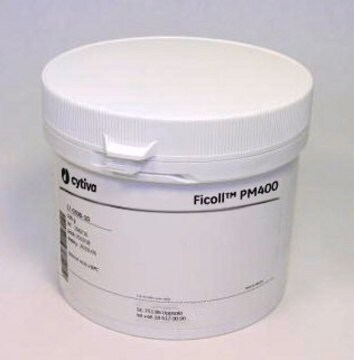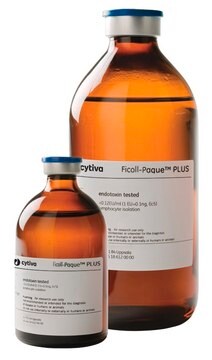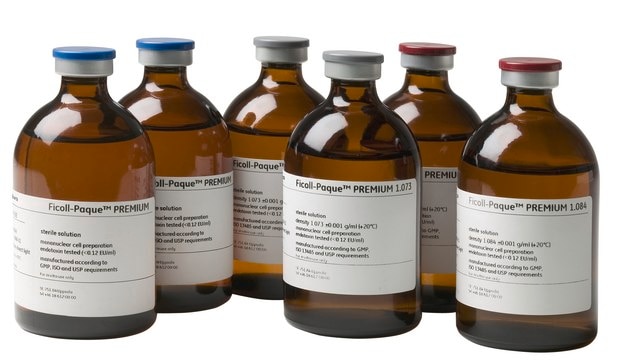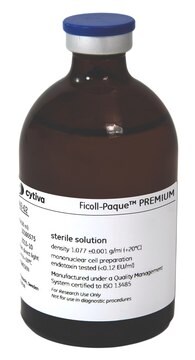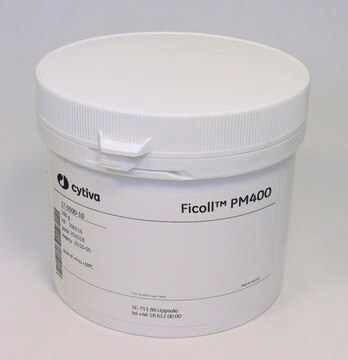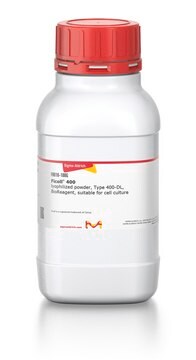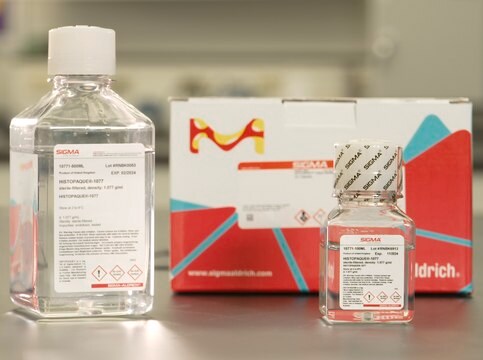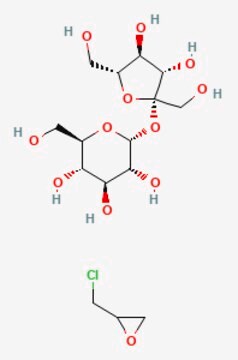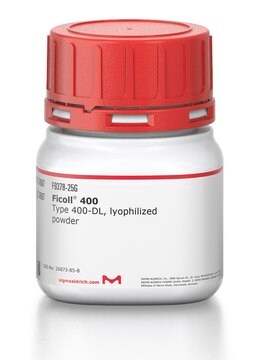GE17-0300-05
Ficoll® PM400
Cytiva 17-0300-05, pack of 5 kg
About This Item
Productos recomendados
Formulario
solid
spray-dried
caducidad
Please be aware this product may be shipped 90 days before the expiration date. For more information on the batch specific expiration date, please contact technical service.
envase
pack of 5 kg
fabricante / nombre comercial
Cytiva 17-0300-05
color
White
solubilidad
soluble (It is delivered as a spray-dried powder and is therefore readily soluble in aqueous media when it is added slowly with concomitant stirring. Any lumps formed during this procedure will dissolve fairly quickly. Concentrations up to 50% (w/v) can easily be attained)
Categorías relacionadas
Descripción general
Ficoll® PM400 is a synthetic neutral, highly-branched hydrophilic polymer of sucrose with an average molecular weight of 400 000. It has long been used to form density gradients for separating and isolating eukaryotic cells, organelles and bacterial cells, as a stabilizing agent, and as a preparation medium for isolating mononuclear cells. Applications can also be found in defined culture media, nucleic acid hybridization, electrophoresis, and immunological studies.
Aplicación
It also has applications in defined culture media, nucleic acid hybridization, electrophoresis, and immunological studies.
Used for gradient centrifugation in all types of centrifuge rotors and for separation at unit gravity.
Características y beneficios
- For producing density gradients for separation of cells and subcellular components by centrifugation or by sedimentation at unit gravity.
- Neutral, highly branched, hydrophilic polymer of sucrose which dissolves readily in aqueous solution.
- Concentrations of up to 50% (w/v) covering densities of up to 1.2 g/mL can be achieved.
- Better osmotic properties than sucrose.
- Preserves functional and morphological integrity.
- Useful for separating cells that are sensitive to centrifugation and for separating cells of similar density but different size (under conditions of sedimentation at unit gravity).
- Does not penetrate biological membranes.
- Serves as the raw material for preparation of Ficoll-Paque gradients.
- Used in other applications such as electrophoresis, hybridization, cryopreservation, and as a hapten carrier.
Almacenamiento y estabilidad
Nota de análisis
Información legal
Código de clase de almacenamiento
13 - Non Combustible Solids
Elija entre una de las versiones más recientes:
Certificados de análisis (COA)
It looks like we've run into a problem, but you can still download Certificates of Analysis from our Documentos section.
Si necesita más asistencia, póngase en contacto con Atención al cliente
¿Ya tiene este producto?
Encuentre la documentación para los productos que ha comprado recientemente en la Biblioteca de documentos.
Los clientes también vieron
Artículos
The effects of the mononuclear cell separation method described by Bøyum procedure are noted below, since research situations may arise in which they are significant.
This page shows methods to remove Percoll from a sample after centrifugation.
The table was compiled to assist the researcher in selecting references most likely to contain relevant information regarding use of Percoll in various cell types.
Density Marker Beads are dyed derivatives of Sephadex™. There are ten color-coded bead types, each with a specific density. They have been specifically formulated for use in Percoll gradients and will not work with other media. Using Density Marker Beads as an external marker facilitates monitoring of the gradient shape and range.
Protocolos
How to use percoll to prepare a gradient
The following procedure has been evaluated with Ficoll-Paque PLUS and is recommended for separation of normal blood samples for maximum reproducibility.
Contenido relacionado
Data was compiled to assist the researcher in selecting references most likely to contain relevant information regarding use of Percoll for a particular cell or tissue type.
Nuestro equipo de científicos tiene experiencia en todas las áreas de investigación: Ciencias de la vida, Ciencia de los materiales, Síntesis química, Cromatografía, Analítica y muchas otras.
Póngase en contacto con el Servicio técnico